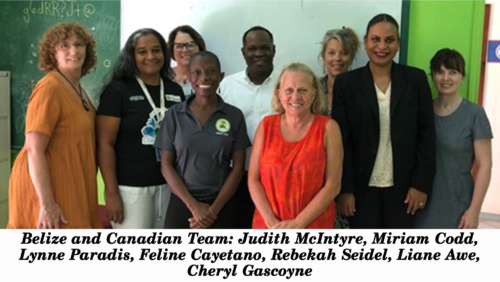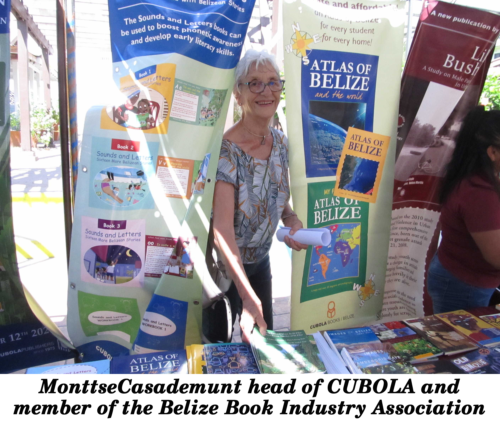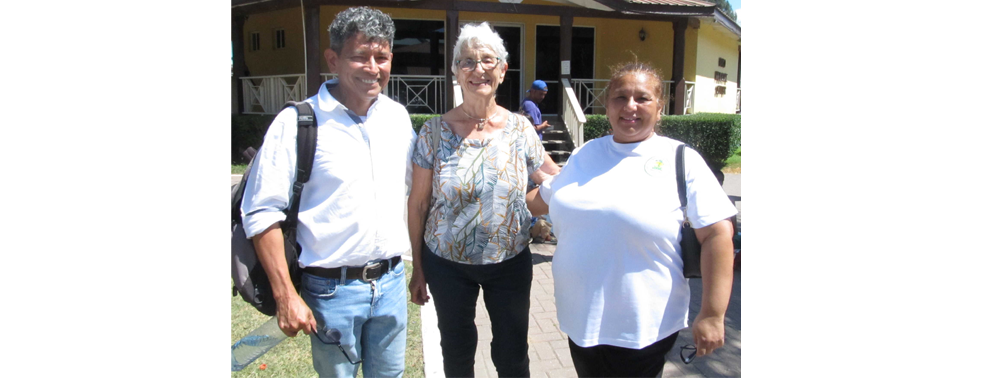Photo: L-R Prolific writer David Ruiz, book publisher Monttse Casademunt, and Chief Librarian Lusiola Castillo’
by Orlando Pulido
SANTA ELENA TOWN, Cayo District, Sat. Apr. 20, 2024
Reading in three-dimensional form or electronically is being encouraged by several entities across schools in Belize. Two such entities, the Belize Book Industry Association and the Rotary International Literacy Alive Project, have joined forces with other partners to increase our literacy rates.
As part of an upcoming Book Week of events, the Belize Book Industry Association (BBIA) held a day of events at the Cayo Welcome Center on Friday. Students from primary and secondary schools were present to listen to speeches from the main actors of the publishing industry.

The president of the BBIA, Felence Cayetano, addressed her audience of students, readers, and book publishers on Friday, reminding them that it was the first day of in-person book week, which is being celebrated this week.
“Read and write in English and Spanish if you can,” she reminded her audience.
Every year, in commemoration of World Book and Copyright Day on April 23rd, the BBIA has organized Book Week, during which a range of activities have been scheduled for San Ignacio on Friday, Benque on Monday, and Belmopan on Tuesday, April 23rd. (Every year on April 23rd, bibliophiles around the globe celebrate World Book and Copyright Day. This international event, organized by the United Nations Educational, Scientific and Cultural Organization (UNESCO), aims to promote the enjoyment of books and reading. This date was chosen by UNESCO’s General Conference in 1995 to pay a worldwide tribute to books and authors, encouraging everyone to access books.)
Early on Friday, Ian Gibson was holding a digital illustration workshop at the San Ignacio Public Library, where he focused on using Photoshop and Adobe Illustrator, which he has used in creating illustrations at CUBOLA, a publisher from Benque. Gibson believes that artificial intelligence or AI is here to stay “because it is our competition and might get better over time.”

Bringing books to the forefront in Belize has always been a challenge, and is becoming even more so as digital devices take up space.
“It’s always the same issues that we have, to bring books to the forefront, to talk about books, to just focus on reading, because books are all about reading, and the issue that we have is that children don’t read anymore, even young children; so we find more children reading because they are at school, but they’re all into the devices still,” said Monttse Cassademunt, vice president of BBIA.
The teams from Reading Alive — a project between Canada and Belize — are tackling such challenges of reading, and have worked on an agreement with the Ministry of Education to have all Standard Two and Three classes in the Government schools implement their program in the north, central, and southern regions of Belize since last September. A quick mid-term assessment earlier this year has garnered some results.
“Early results are very positive. The program is making a difference! However, for more Belize children to benefit we need support from the schools and the Ministry of Education to continue the program next year, to provide support to teachers and students who were not actively implementing the program this year,” reported Dr. Lynne Paradis, who heads the international collaboration, an effort between the Rotary Club in Reindeer Alberta, Canada, and the San Ignacio Rotary Club.
Dr. Paradis’s representative on the ground in Belize is Rebekah Seidel, who says that “it was found that after COVID, the Ministry [of Education] recognized that children had really fallen behind in their reading abilities because school had been closed for two years.”
Belizeans became aware of a program that had been developed by the University of Alberta in Alberta, Canada, that had great success in “catching kids quickly in their reading abilities, so we have worked with the Ministry [of Education] on that over the last year, and had seen good success rates come from that year’s project,” Rebekah Seidel told Amandala.
Dr. George Georgiou, from the University of Alberta, with a collaborative team of Belize educators and the Reading Alive team, was able to make adjustments to the program — customized for Belize schools. As time passed, those efforts were transformative in the lower-level primary schools.
The Ministry of Education, Culture, Science and Technology (MoECST) has identified four lead educators to monitor and support implementation. Ms. Melissa Andrade, Government School Manager, was identified as the lead contact and worked with the team of Marion Nolberto, Lianne Awe, and Miriam Codd. Paradis celebrated the fact that the success of the project has been tremendously accelerated due to the dedicated work of the Belize team under Ms. Andrade’s leadership.
The data collected demonstrates evidence of program success. In summary, the February 2024 results of midpoint testing showed notable student growth in reading in participating schools.
The rate of success after eleven weeks of instruction ranged from 20% to 95% improvement. This shows significant learning growth, and that where the program is implemented children are improving reading skills and developing decoding and reading strategies that will accelerate reading confidence and success.
Ms. Andrea Guerra and her administration team from the Santa Elena Primary School in Cayo have embraced this program. Daily reading intervention was one of their goals for school-wide implementation. The teachers understood the elements of the program, and when it was delivered consistently it was a success. Ms. Andrea felt that the reading intervention ensured that all students developed skills in the language arts. It is worthwhile when used daily, with patience and consistency. It aids children in developing a functional reading ability which is important beyond school walls.
All program resources and necessary training are free of charge with the Alberta government, Canada, who released the materials to Belize to address a reading crisis. This phase of the project ends in June, and it is hoped that other schools and communities can embrace the literacy support in schools and in local libraries and increase participation in the program.
The Belize National Library Service and Information Systems (BNLSIS), also a member of the BBIA, has been actively involved in supporting the reading intervention program implemented in Standard Two and Three classes in all government schools across Belize this current school year. The BNLSIS is committed to the literacy of children and has played a vital role in reading support outside of school hours. Some libraries have been asked directly by primary schools to offer assistance to students who were struggling with reading. In addition, branch and community libraries across all six districts in Belize included components of the reading intervention in their summer programs in July and August 2023. All libraries have plans to include reading intervention support in their 2024 summer programs.
“[The] Rotary International Project is to promote literacy, and libraries is all about promoting literacy. One of our pillars is to generate interest in reading from infants to adulthood, so we have the responsibility of ensuring that, apart from it being an educational component, it has to have a recreational component to it as well; so that is where libraries retain the Literacy Alive Project that the International Rotary is funding,” said Lusiolla Castillo, Chief Librarian for the Belize National Library Service and Information System, who oversees 49 library service points across Belize.
Dr. Lynne Paradis concludes, “We know that if you can keep the conversation and awareness of literacy active in communities, and support it in both schools and community libraries, literacy rates in a country can improve, which has long-term benefits in the economic, social, and personal success of citizens. COVID had a dramatic impact on education across the world, and it is praiseworthy that Belize is taking active steps to try to rescue children who fell behind.”

